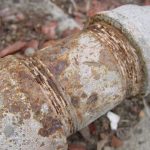There are many aspects to preparing your home and family for earthquakes. It’s a great idea to have some supplies on hand, but one of the less discussed areas is plumbing. During an earthquake, your plumbing pipes, fixtures, and fittings will also be under a great deal of stress. A burst pipe could cause flooding and water damage is notoriously expensive to repair. Let’s take a closer look at how you can prepare your plumbing in advance for an earthquake.
Securing a Water Heater
A water heater should always be secured to a wall and this especially true in an area that’s prone to earthquakes. A tank water heater is a heavy piece of equipment, especially if it’s full of water and it could represent a real health risk if it crashes on someone. If the water heater is fueled from a natural gas supply, this can also make it a volatile threat in an earthquake emergency situation.
Taking Precautions with a Gas Water Heater
There are a number of different makes and models of water heater on the market, and some are riskier than others in an earthquake. A natural gas water heating system is a popular choice all across the country because it’s practical, quick and inexpensive to buy. Natural gas as a fuel is an extremely cost effective choice compared to electricity for heating water and the home. As well as securing the water heater to the wall as mentioned above, extra steps should be taken to keep any combustible or flammable materials far away from a gas fueled unit. In the event of an earthquake, any subsequent gas leaks will have less material in the area to fuel a fire.
Earthquake Readiness Plumbing Codes
Anyone that has lived in different areas may already know that plumbing codes can vary a great depending on where you live. The Federal Emergency Management Agency (FEMA) has released a set of comprehensive national building codes that are focused on seismic rehabilitation. This is designed to show how buildings should be built and retrofitted to make them earthquake ready.
These codes mention water heaters because of their possible volatile nature during an earthquake. The main recommendations in relation to water heaters are the secure fixing to a wall and their proximity to flammable materials and objects. Fires that spread quickly are a particular concern after a major earthquake has occurred. The fire department may be overwhelmed and unable to respond to every reported fire. Of course, it may not even be able to contact emergency services if the phone network has gone down.
The specific policies related to water safety in an earthquake can differ a great deal from state to state. These policies are also subject to change, as an example: After the Loma Prieta earthquake in 1989 a number of water heater broke their straps and experts made specific recommendations, the state codes were amended later to reflect these changes.
If you’re unsure about how to secure your water heater for an earthquake get in touch with your
local certified plumber and they will be happy to help.
By Giovanni Longo President Flood Brothers Plumbing
Giovanni Longo is a 3rd generation master plumber who has been practicing his craft and trade in the greater Los Angeles area for well over a decade and a half. A plumbing and hydraulics-engineering innovator, Giovanni’s particular world-class expertise focuses on dealing with challenging sewer system designs as well as resolving complex commercial and residential draining issues. As a certified Flood Mitigation expert, he is also well versed in a wide variety of water damage and remediation solution.





